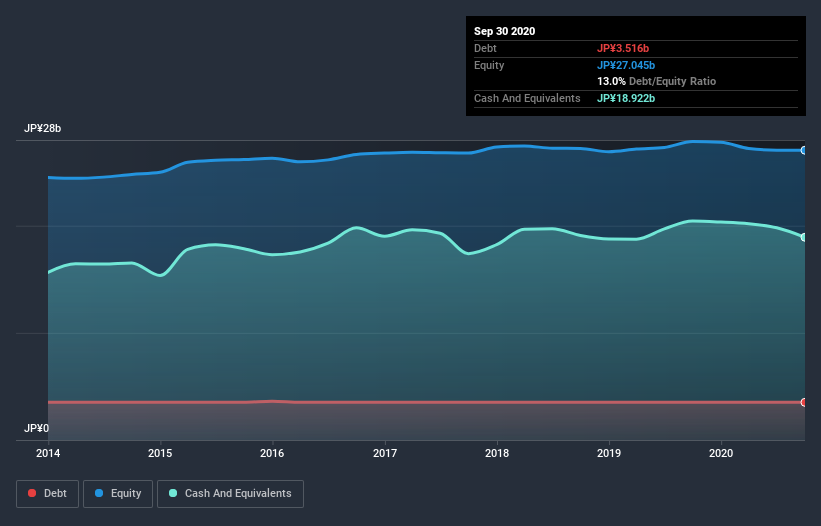
The external fund manager backed by Berkshire Hathaway's Charlie Munger, Li Lu, makes no bones about it when he says 'The biggest investment risk is not the volatility of prices, but whether you will suffer a permanent loss of capital.' So it might be obvious that you need to consider debt, when you think about how risky any given stock is, because too much debt can sink a company. As with many other companies Musashi Co., Ltd. (TYO:7521) makes use of debt. But should shareholders be worried about its use of debt?
What Risk Does Debt Bring?
Debt is a tool to help businesses grow, but if a business is incapable of paying off its lenders, then it exists at their mercy. If things get really bad, the lenders can take control of the business. However, a more frequent (but still costly) occurrence is where a company must issue shares at bargain-basement prices, permanently diluting shareholders, just to shore up its balance sheet. By replacing dilution, though, debt can be an extremely good tool for businesses that need capital to invest in growth at high rates of return. The first thing to do when considering how much debt a business uses is to look at its cash and debt together.
See our latest analysis for Musashi
What Is Musashi's Debt?
The chart below, which you can click on for greater detail, shows that Musashi had JP¥3.52b in debt in September 2020; about the same as the year before. However, it does have JP¥18.9b in cash offsetting this, leading to net cash of JP¥15.4b.

A Look At Musashi's Liabilities
The latest balance sheet data shows that Musashi had liabilities of JP¥11.6b due within a year, and liabilities of JP¥1.91b falling due after that. Offsetting these obligations, it had cash of JP¥18.9b as well as receivables valued at JP¥7.93b due within 12 months. So it can boast JP¥13.4b more liquid assets than total liabilities.
This surplus liquidity suggests that Musashi's balance sheet could take a hit just as well as Homer Simpson's head can take a punch. With this in mind one could posit that its balance sheet is as strong as beautiful a rare rhino. Simply put, the fact that Musashi has more cash than debt is arguably a good indication that it can manage its debt safely. When analysing debt levels, the balance sheet is the obvious place to start. But it is future earnings, more than anything, that will determine Musashi's ability to maintain a healthy balance sheet going forward. So if you're focused on the future you can check out this free report showing analyst profit forecasts.
In the last year Musashi had a loss before interest and tax, and actually shrunk its revenue by 19%, to JP¥32b. We would much prefer see growth.
So How Risky Is Musashi?
Statistically speaking companies that lose money are riskier than those that make money. And the fact is that over the last twelve months Musashi lost money at the earnings before interest and tax (EBIT) line. Indeed, in that time it burnt through JP¥1.0b of cash and made a loss of JP¥140m. With only JP¥15.4b on the balance sheet, it would appear that its going to need to raise capital again soon. Overall, its balance sheet doesn't seem overly risky, at the moment, but we're always cautious until we see the positive free cash flow. When we look at a riskier company, we like to check how their profits (or losses) are trending over time. Today, we're providing readers this interactive graph showing how Musashi's profit, revenue, and operating cashflow have changed over the last few years.
Of course, if you're the type of investor who prefers buying stocks without the burden of debt, then don't hesitate to discover our exclusive list of net cash growth stocks, today.
When trading Musashi or any other investment, use the platform considered by many to be the Professional's Gateway to the Worlds Market, Interactive Brokers. You get the lowest-cost* trading on stocks, options, futures, forex, bonds and funds worldwide from a single integrated account. Promoted
New: Manage All Your Stock Portfolios in One Place
We've created the ultimate portfolio companion for stock investors, and it's free.
• Connect an unlimited number of Portfolios and see your total in one currency
• Be alerted to new Warning Signs or Risks via email or mobile
• Track the Fair Value of your stocks
This article by Simply Wall St is general in nature. It does not constitute a recommendation to buy or sell any stock, and does not take account of your objectives, or your financial situation. We aim to bring you long-term focused analysis driven by fundamental data. Note that our analysis may not factor in the latest price-sensitive company announcements or qualitative material. Simply Wall St has no position in any stocks mentioned.
*Interactive Brokers Rated Lowest Cost Broker by StockBrokers.com Annual Online Review 2020
Have feedback on this article? Concerned about the content? Get in touch with us directly. Alternatively, email editorial-team@simplywallst.com.
About TSE:7521
Musashi
Provides information/industrial, printing, cash handling, and election systems equipment in Japan and internationally.
Solid track record with excellent balance sheet.
Market Insights
Community Narratives




